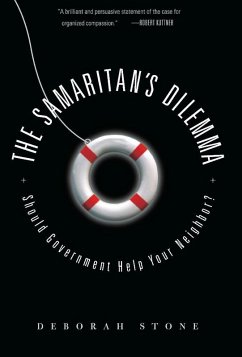It wasn't always this way. For Americans who came of age shortly after World War II, politics was a field of dreams. Democracy promised to cure the world's ills. But starting in the late seventies, conservative economists promoted self-interest as the source of all good, and their view became public policy. Government's main role was no longer to help people, but to get out of the way of personal ambition. Politics turned mean and citizens turned away.
In this moving and powerful blend of political essay and reportage, award-winning political scientist Deborah Stone argues that democracy depends on altruism, not self-interest. The merchants of self-interest have divorced us from what we know in our pores: we care about other people and go out of our way to help them. Altruism is such a robust motive that we commonly lie, cheat, steal, and break laws to do right by others. "After 3:30, you're a private citizen," one home health aide told Stone, explaining why she was willing to risk her job to care for a man the government wanted to cut off from Medicare.
The Samaritan's Dilemma calls on us to restore the public sphere as a place where citizens can fulfill their moral aspirations. If government helps the neighbors, citizens will once again want to help govern. With unforgettable stories of how real people think and feel when they practice kindness, Stone shows that everyday altruism is the premier school for citizenship. Helping others shows people their common humanity and their power to make a difference.
At a time when millions of citizens ache to put the Bush and Reagan era behind us and feel proud of their government, Deborah Stone offers an enormously hopeful vision of politics.
Dieser Download kann aus rechtlichen Gründen nur mit Rechnungsadresse in A, B, BG, CZ, D, DK, EW, E, FIN, F, GR, HR, H, IRL, I, LT, L, LR, NL, PL, P, R, S, SLO, SK ausgeliefert werden.
Hinweis: Dieser Artikel kann nur an eine deutsche Lieferadresse ausgeliefert werden.









